Iranian Security Forces Detain Journalists

Several journalists from Iran's liberal-leaning Fardaye Eghtesad newspaper were arrested on Monday amid further state crackdowns on the media.

Several journalists from Iran's liberal-leaning Fardaye Eghtesad newspaper were arrested on Monday amid further state crackdowns on the media.
According to the few journalists who have since been released, their possessions such as mobile phones have been confiscated but details of the charges and the entity involved in the arrests have not been announced. Six people, including senior editors, are still being held in the building. Officials also conducted an extensive investigation at the office of Fardaye Eghtesad website.
Mizan, the official news agency of the judiciary of the Islamic Republic, issued a statement Tuesday, explaining that their investigations show that the security raid to the office of the newspaper and the arrest of an economic journalist had no connection to journalistic or media activities. The judiciary said that the case is being followed by another security authority in the country, which is mainly theintelligence apparatus in such cases.
Etemad Online reported on Tuesday that journalist Mehdi Afsharnik, whose arrest was also announced Monday, was detained on Wednesday, January 31, while the reason and the entity behind his detention are still not clear.
Criticism has emerged regarding the lack of transparency from official authorities, with no clear explanation provided for nearly 20 hours following the incident. Some journalists have described the action as tantamount to “hostage-taking.”
In Iran, journalists have been under pressure for years and are detained, imprisoned, and banned from work under various pretexts.
Last year's Freedom House report on global freedoms ranked Iran 12th in the 100 least free countries in the world.
In the 12 months following the Women, Life, Freedom uprising of 22, at least 79 journalists had been arrested, with the trend continuing, according to rights group Reporters Without Borders.
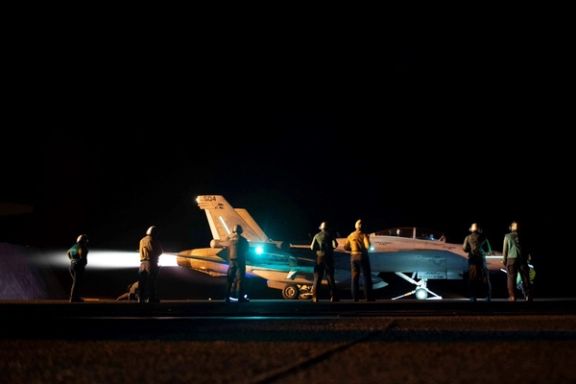
Armed groups backed by Iran have carried out at least two strikes on American forces since Friday, when the United States hit dozens of Iran-related targets in Syria and Iraq.
Pentagon spokesperson Maj. Gen. Patrick Ryder confirmed in a press briefing Monday that two attacks had taken place in Syria and that there had been no casualties. He also suggested that the Pentagon expects Iran's proxy groups to continue their targeting of American forces in spite of the February 3rd US airstrikes.
In the meantime, Yemen's Iran-aligned Houthis said on Tuesday they fired naval missiles at two ships, Star Nasia and Morning Tide, in the Red Sea.
The group's military spokesman Yahya Sarea said in a televised speech that they were US and British ships, but records from shipping trackers show they are flagged to the Marshall Islands and Barbados.
The US air campaign against targets in Syria and Iraq was authorized in response to the drone attack on January 28 that resulted in the deaths of three American soldiers and injuries to 40 others at a US base in Jordan. President Joe Biden and his team heavily publicized it both domestically, as evidence of their resolve, and internationally, as a deterrent against such attacks. As things stand, it is hard to say if the administration achieved these two goals.
At home, pressure is still mounting. Biden critics are by no means satisfied with his shot at ‘retaliation’. They accuse him of giving Iran’s Revolutionary Guards (IRGC) enough time and clues to disperse and avoid a bloodied nose. And abroad, the message from Iran is clear: we had no presence or interest in the sites targeted –if we had, we would have hit back.
Ryder confirmed in his briefing that no Iranians were killed in the US airstrikes in Iraq and Syria in the early hours of Saturday local time. “CENTCOM is continuing to assess but initial indications are: we’re not aware of any Iranians killed,” he said.
What irked the critics was Maj. Gen. Ryder's remark that the administration doesn’t want a long-term campaign against Iran's military and associated proxy groups in Iraq and Syria. This apparently contradicts statements in the past ten days that the US is not done with those groups and will continue to target them.
“Our goal is not to… go full-scale war against Iranian proxy groups in Iraq and Syria,” Ryder said. “That’s not what we’re there for. We’re there to conduct the mission and support the defeat of [the Islamic State].”
Critics of the Biden administration say that such messaging is counterproductive as it signals “weakness”, which emboldens Iran and its proxies to be more adventurous, ultimately forcing the US to target IRGC or other regime assets directly, which, ironically, is what President Biden seems determined to avoid at all costs.
“I think you need a decisive strike, just like Trump did with Soleimani,” the House Foreign Affairs Committee Chair Michael McCaul told Fox News Monday. “They took Soleimani out and guess what, Iran backed down.”
Rep. McCaul also said that the retaliatory strikes last Friday were not satisfactory, contrary to what Ryder said in his briefing. “The targets may have been good,” McCaul said, “but the success was not.”
Officials from the Biden administration have repeatedly said that the airstrikes on IRGC-affiliated targets in Iraq and Syria were just the beginning, and that there’s more to come. But there seems to be a growing concern in Washington that even a string of attacks would fail to deter Iran –unless it hits “what matters to the Ayatollah.”
A Wall Street Journal editorial Tuesday drew a bleak picture, taking into account Iran’s nuclear ambitions.
“President Biden’s retaliatory strikes in Iraq and Syria on the weekend were targeted to avoid hitting Iranians to avoid escalation,” the WSJ editorial reads,. “Imagine the restraints on the U.S. when Iran has nuclear weapons and the missiles to deliver them against U.S. allies or the U.S. homeland.”
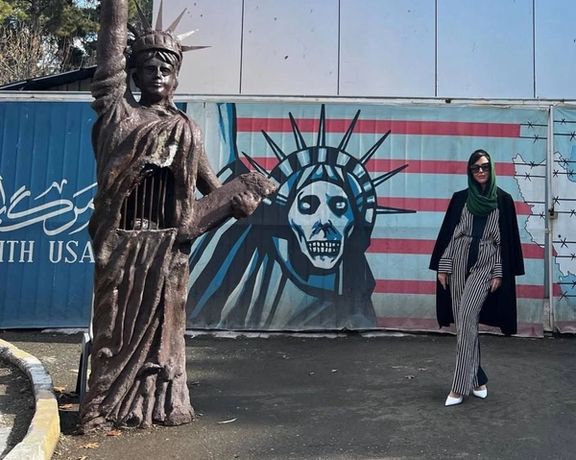
Iran's foreign ministry spokesman, Naser Kanaani, stated on Monday that he had no knowledge of the recent visit to Iran by American porn actress Whitney Wright, which has stirred controversy among many Iranians.
“I don’t know about the matter you are referring to,” Naser Kanaani said when asked by a reporter Monday at his weekly press briefing about “an American national’s visit” to Iran. “American citizens are not prohibited from traveling to Iran,” he said.
Wright's visit to Iran last week ignited a firestorm on Iranian social media. Some social media users have alleged that authorities either invited or facilitated her visit due to her outspoken anti-Israeli and pro-Palestinian stances. She further stirred controversy by sharing photos of herself wearing a full hijab, in compliance with Iran's dress code for women, and asserting that Iran is safe "if you follow the rules."
The 32-year-old pornographic actress and erotic model, born in Oklahoma with mixed Welsh and Native American heritage, is known for her strong support of Palestine and vocal anti-Israeli sentiments.
Critics argue that Wright's claim of Iran's safety ignores the fact that not only is pornography banned in Iran, with severe penalties for those involved in its production, but ordinary Iranian women also face humiliation and arrest for not adhering to the country's strict dress code.
In 2018, Iranian web designer Saeed Malekpour, based in Canada, was arrested during a visit to Iran and subsequently sentenced to death for his involvement in designing and moderating pornographic websites. Malekpour, who later managed to flee Iran, maintained that he had no knowledge that his software could be used for sharing pornography.
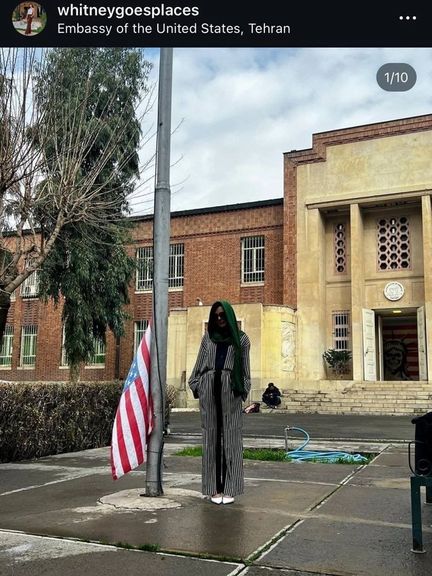
The Tasnim news agency, linked to Iran's Revolutionary Guards (IRGC), quoted "an informed source" on Monday, stating that Wright had not been invited to Iran by any government entity. According to the source, she traveled to Iran privately after obtaining a visa, and visa authorities were unaware of the nature of her profession.
Tasnim also claimed that Wright's visits to locations such as the former American embassy compound in Tehran and the Golestan Palace were entirely her own initiatives and conducted privately.
One of Wright's posts featured her posing beside a lowered American flag at the former US embassy compound in Tehran. In another post, she stood beside a Statue of Liberty, behind which a mural depicted the statue's face as a skeleton on the wall.
Additionally, her posts included a photo of a wall adorned with images of Qasem Soleimani, the former commander of the IRGC's extra-territorial forces, Abu Mahdi al-Muhandis, an Iraqi militant leader, and Muslim "revolutionaries" from various countries, including Saudi Arabia and Afghanistan. This photo appears to have been taken at the former US embassy building.
Wright expressed disappointment in her post that images of Palestinian revolutionaries were not included in the display.
The embassy compound was seized by revolutionary students in 1979, who held embassy staff hostage for 444 days. The Basij militia organization, affiliated with the IRGC, has been stationed at the former US embassy compound in Tehran since 2018.
In response to criticism, Wright disabled comments on her posts and defended her actions, stating, "Posting photos of my trip to Iran now means I'm pushing Iranian propaganda? I'm sharing exhibits from a museum that are rarely seen. It's not an endorsement of the government." She later removed the photos and videos taken in Iran from her social media platforms following reports by numerous Iranian users.
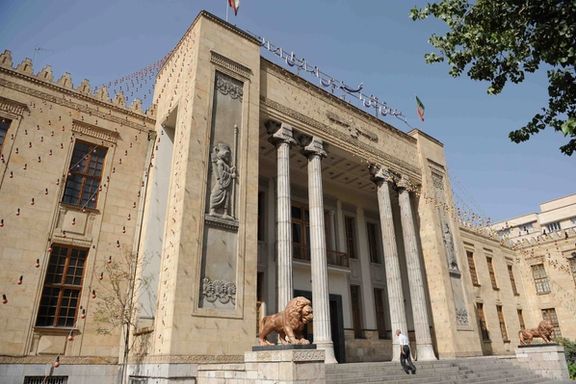
A member of Iran's Chamber of Commerce has dismissed reports in Iraqi media that Baghdad has revoked the operating license of Iran's National Bank (Bank Melli), a government institution.
Mohsen Chaman-Ara, speaking to Fars News Agency, claimed that “commercial transactions between Iraq and Iran continue unaffected.” Earlier an Iraqi news website published the copy of a letter sent by a deputy director of Iraq's central bank notifying the Iranian bank of the decision to revoke its license.
Amid the backdrop of extensive US attacks on positions linked to the Islamic Republic in the region, the US Treasury Department has launched a fresh round of pressures on Iraqi banks, ostensibly aiming to block Iran's access to US dollars via Iraq.
The action was implemented to combat fraud, money laundering, and other illicit uses of the US currency shortly after a visit by a high-ranking US Treasury official. The measures align with US regulations aimed at preventing the unlawful funneling of dollars to Iran and exerting pressure on Tehran in conjunction with US sanctions related to its nuclear program and other conflicts.
As an intermediary between the United States and Iran, Iraq, which holds over $100 billion in reserves in US banks, relies heavily on Washington's cooperation to ensure access to its oil revenues kept in US banks.
Referring to a document from the Iraqi central bank authenticated by a bank official, Reuters identified the banned institutions as Ahsur International Bank for Investment, Investment Bank of Iraq, Union Bank of Iraq, Kurdistan International Islamic Bank for Investment and Development, Al Huda Bank, Al Janoob Islamic Bank for Investment and Finance, Arabia Islamic Bank, and Hammurabi Commercial Bank.
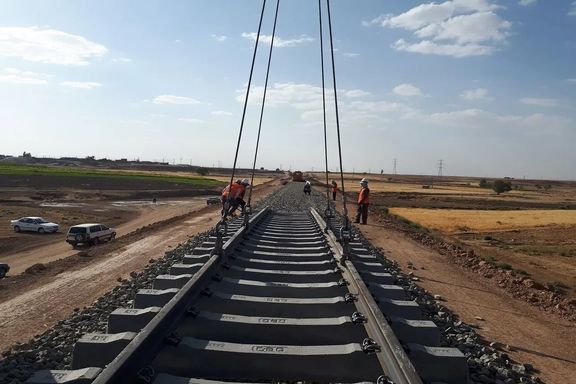
Iran has announced a $20-billion high-speed train network to be funded through the National Development Fund and oil barter agreements amid the country's worst ever economic crisis.
The announcement comes on the back of an admission from Hassan Aboutorabi-Fard, the Interim Friday Prayer Imam of Tehran, who revealed last month that the government had yet to return $100 billion it had withdrawn from Iran’s National Development Fund (NDF). The withdrawal represents two-thirds of Iran’s aggregate reserve fund, which was initially estimated to be as high as $150 billion.
The ambitious plans for the sanctions-hit nation see the line stretch from Esfahan (Isfahan) to Tehran and then to Mashhad in the northeast. Mohsen Mansouri, the executive deputy of the president said, "The implementation of the project requires substantial resources, and the estimated figure is around $20 billion; however, once the studies are completed, the exact figure can be stated. This figure presents a mega-project to us, and we cannot use public resources to fund it."
Mansouri's remarks were made on Monday during a trip to Semnan province, where he revealed that the president had convened a special session with officials from the Oil Ministry, the Plan and Budget Organization, and the Ministry of Roads and Urban Development to secure the necessary resources.
The NDF, established in the early 2000s, was designed to preserve a portion of oil revenues for future generations and Iran’s development. However, as international sanctions hit Iran during 2011-2013, the administration of former president Mahmoud Ahmadinejad initiated withdrawals from the fund.
Even after the end of sanctions in 2015 following a nuclear agreement, withdrawals persisted throughout Rouhani’s two terms (2013-2021), totaling $30 billion during his initial tenure. The reimposition of sanctions by former US President Donald Trump led to increased reliance on reserves, resulting in negative cash flow in the NDF.
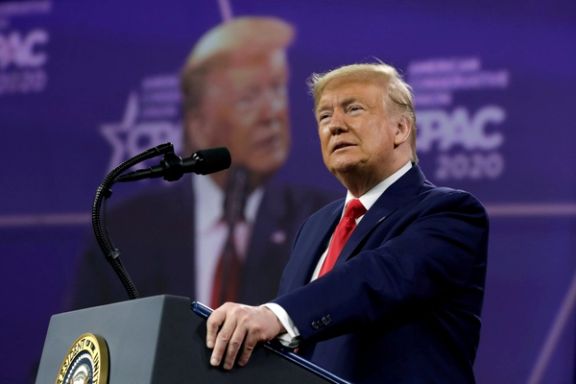
Former US President Donald Trump claimed Israel helped plan the 2020 assassination of Quds Force commander Qassem Soleimani, but pulled out of the operation two days prior to the killing.
In an interview with Fox News, Trump said, “When we took out Soleimani, you know Israel was supposed to do it with us. Two days before the take-out, they said, ‘We can’t do it. We can’t do it.’ I said ‘What?’ ‘We can’t do it,'” the Republican presidential frontrunner added.
Despite Israel's withdrawal, Trump claimed he proceeded with the operation in Iraq after consulting with a general who affirmed the possibility of executing it independently. He was killed in a drone strike near Baghdad Airport.
The former president, currently vying for a new presidential term, also highlighted his administration's efforts in deterring attacks by Iranian militias on US forces in a veiled reference to the more than 160 attacks since October 7 alone, under Joe Biden.
Qassem Soleimani was instrumental in arming and training various armed groups across the Middle East as the head of Iran's proxy forces.
Following Soleimani's death, Israeli Prime Minister Benjamin Netanyahu had commended Trump for the strike that eliminated the influential Iranian general in January 2020.
At the time, he said, “Trump is worthy of full appreciation for acting with determination, strongly and swiftly ... We stand fully by the United States in its just battle for security, peace, and self-defense.”